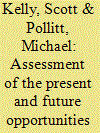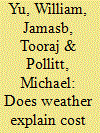| Srl | Item |
| 1 |
ID:
099298


|
|
|
|
|
| Publication |
2010.
|
| Summary/Abstract |
As global fuel reserves are depleted, alternative and more efficient forms of energy generation and delivery will be required. Combined heat and power with district heating (CHP-DH) provides an alternative energy production and delivery mechanism that is less resource intensive, more efficient and provides greater energy security than many popular alternatives. It will be shown that the economic viability of CHP-DH networks depends on several principles, namely (1) the optimisation of engineering and design principles; (2) organisational and regulatory frameworks; (3) financial and economic factors. It was found that in the long term DH is competitive with other energy supply and distribution technologies such as electricity and gas. However, in the short to medium term it is shown that economic risk, regulatory uncertainty and lock-in of existing technology are the most significant barriers to CHP-DH development. This research suggests that under the present regulatory and economic paradigm, the infrastructure required for DH networks remains financially prohibitive; the implementation of government policies are complicated and impose high transaction costs, while engineering solutions are frequently not implemented or economically optimised. If CHP-DH is going to play any part in meeting climate change targets then collaboration between public and private organisations will be required. It is clear from this analysis that strong local government involvement is therefore necessary for the co-ordination, leadership and infrastructural deployment of CHP-DH.
|
|
|
|
|
|
|
|
|
|
|
|
|
|
|
|
| 2 |
ID:
094240


|
|
|
|
|
| Publication |
2010.
|
| Summary/Abstract |
The purpose of this paper is to examine the lessons from the recent history of telecoms deregulation for electricity (and by implication heat) network regulation. We do this in the context of Ofgem's RPI-X@20 Review of energy regulation in the UK, which considers whether RPI-X-based price regulation is fit for purpose after over 20 years of operation in energy networks. We examine the deregulation of fixed line telecoms in the UK and the lessons which it seems to suggest. We then apply the lessons to electricity networks in the context of a possible increase in distributed generation directly connected to local distribution networks. We conclude that there is the possibility of more parallels over time and suggest several implications of this for the regulation of electricity and heat networks.
|
|
|
|
|
|
|
|
|
|
|
|
|
|
|
|
| 3 |
ID:
092555


|
|
|
|
|
| Publication |
2009.
|
| Summary/Abstract |
In recent years, a number of empirical studies and energy regulators have applied benchmarking techniques to measuring the efficiency and performance of network utilities. An important issue has been the extent to which the results are influenced by contextual factors. Among these, weather factors are frequently discussed as being important. We use factor analysis and two-stage data envelopment analysis techniques to examine the effect of a set of important weather factors (gale, hail, temperatures, rainfall and thunder) on the performance of electricity distribution networks in the UK. The results indicate that such factors often do not have a significant economic and statistical effect on the overall performance of the utilities. The weather parameters in some models are significant in terms of economic efficiency. The results echo our previous findings of the importance of extending the basic model to include other inputs such as total expenditure (Totex), customer minutes lost (CML) and network energy losses in regulatory benchmarking.
|
|
|
|
|
|
|
|
|
|
|
|
|
|
|
|
| 4 |
ID:
097344


|
|
|
|
|
| Publication |
2010.
|
| Summary/Abstract |
Different from previous efficiency researches, which normally assume a uniform disposability for all undesirable outputs in a production process, this paper proposes a model that distinguishes weak and strong disposability assumptions among various undesirable outputs based on their respective technical features. The paper illustrates the approach using a research sample covering 582 base-load Chinese coal-fired power plants in 2002. The final results show that imposing the technically correct disposability features on undesirable outputs makes a significant difference to the final efficiency evaluation. This suggests the necessity of properly distinguishing disposability features among undesirable outputs in a production process in efficiency models.
|
|
|
|
|
|
|
|
|
|
|
|
|
|
|
|